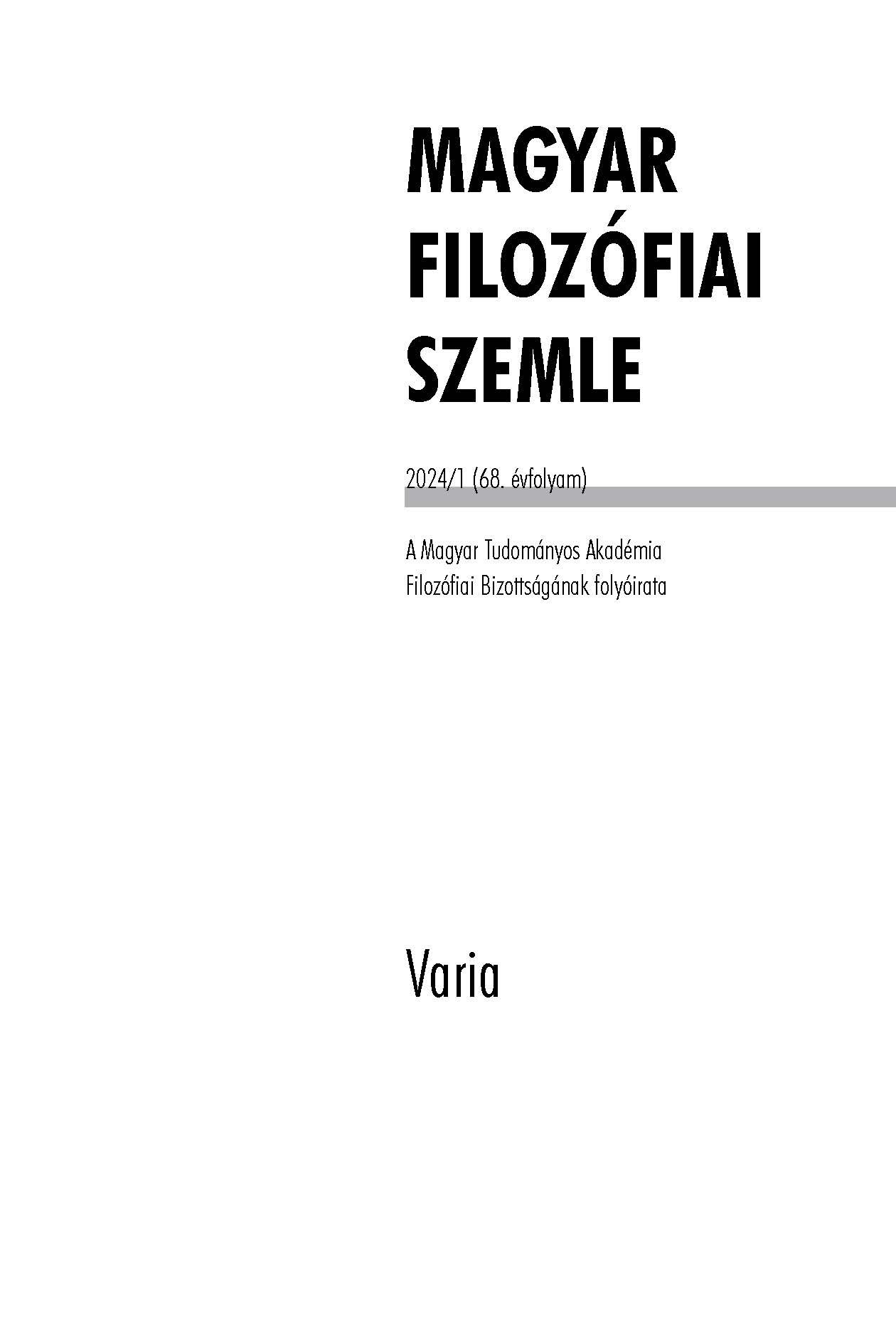At the Intersection of Science and Phenomenology
Reflections on Mihály Vajda’s First Productive Period
Abstract
Mihály Vajda returned from time to time to the sensitive problem of the „abstract truth” of academic scholarship and the „prosaic experience of reality” of the socalled lifeworld in his oeuvre spanning more than half a century. In his first productive period, Vajda focused on the question of evidence and the truth criteria of analytic versus synthetic judgments. There are no eternal and unquestionable evidences, scientific truths, because science itself is part of changing social practice, and natural sciences, although they describe or attempt to systematize nature independent of man, always represent nature given to man of a given epoch. Philosophy cannot give up its original mission of universal understanding of the world, which is also
closely linked to social practice, and therefore cannot accept to be forced into the role of being merely „one science among others”. The last third of the paper analyses the chapter on the relationship between science and philosophy in the work of Erik Grigoryevich Yudin, who died tragically young, entitled Systems Theory and Activity, published in the 1970s. Yudin also argues for the autonomy of philosophical knowledge, and stresses that philosophy never loses its relationship with forms of knowledge that are essentially ideological and religiously rooted, such as folkloristic and other naïve constructions of reality.
References
Descola, Philippe 2005. Par-delà nature et culture. Paris, Éditions Gallimard.
Descola, Philippe 2011. Jenseits von Natur und Kultur. Ford. Eva Moldenhauer. Frankfurt am Main, Suhrkamp Verlag.
Gadamer, Hans-Georg 2003. Igazság és módszer. Ford. Berényi Gábor. Budapest, Osiris Kiadó. Második, javított kiadás.
Judin, Erik Grigor'evič 2009. Systemansatz und Tätigkeitsprinzip. Methodologische Probleme der modernen Wissenschaft. Ford. Isolda Luschberger-Maschke. In Georg Rückriem (szerk.) Erik Grigor'evics Judin. Berlin, Lehmanns Media. 61-400.
Jugyin, Erik Grigorjevics 1978. Sziszteyemnij podhod i princip gyejatyelnosztyi. Metodologgicseszkije poblemi szovromennoj nauki. Moszkva.
Jugyin, Borisz Grigorjevics (szerk.) 2010. Erik Grigorjevics Jugyin. Moszkva, ROSSZPEN. Főleg 5-142.
Lurija, Alekszandr 1975. A pszichológia mint történettudomány. Ford. Józsa Péter. In uő: Válogatott tanulmányok. Budapest, Gondolat Kiadó. 17-42.
Motrosilova, Nelli 1976. Fenomenológia. Ford. Zalai Edvin. In M. Sz. Julina (szerk.) A polgári filozófia a XX. században. Budapest, Kossuth Könyvkiadó. 207-249.
Quine, Willard van Orman 1999. Az empirizmus két dogmája. Ford. F. Szabó István. In Forrai Gábor - Szegedi Péter (szerk.) Tudományfilozófia. Szöveggyűjtemény. Budapest, Áron Kiadó. 131-151.
Seidel, Helmut 1966. Vom praktischen und theoretischen Verhältnis der Menschen zur Wirklichkeit. Deutsche Zeitschrift für Philosophie. 14/10. 1177-1191. https://doi.org/10.1524/dzph.1966.14.10.1177
Thomas, Michael 1987. Edmund Husserl. Zur Genesis einer spätbürgerlichen Philosophie. Berlin, Akademie Verlag.
Vajda Mihály 1993. A posztmodern Heidegger. Budapest, T-Twins Kiadó, Lukács Archívum.
Vajda Mihály 2013. Fiatalkori írások. Pozsony, Kalligram Kiadó.
Vajda Mihály 2013a. Marxizmus és praxisfilozófia. In Vajda 2013. 15-57.
Vajda Mihály 2013b. Objektív természetkép és társadalmi praxis. In Vajda 2013. 127-146.
Vajda Mihály 1975. Marxismus, Existenzialismus, Phänomenologie. Ein Dialog. In Individuum und Praxis. Positionen der Budapester Schule. Frankfurt am Main, Suhrkamp Verlag.
Veljak, Lino (szerk.) 2014. Gajo Petrović, Filozof iz Karlovaca. Zagreb, Hrvastsko filozofska društvo.
Wittich, Dieter 2001. Lenins Buch "Materialismus und Empiriokritizismus". In Gerhardt Volker, Hans-Christoph Rauh (szerk.) Anfänge der DDR-Philosophie. Beerlin, Ch. Links Verlag, Berlin.



